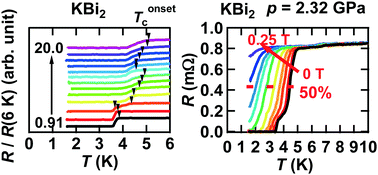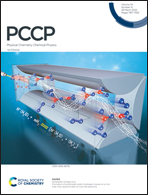Pressure dependence of superconductivity in alkali-Bi compounds KBi2 and RbBi2†
Abstract
The structural and superconducting properties of alkali-Bi-based compounds, KBi2 and RbBi2, were investigated over a wide pressure range for the first time. The samples of KBi2 and RbBi2 were prepared using a liquid ammonia (NH3) technique, and demonstrated superconductivity with superconducting transition temperatures, Tc, of 3.50 and 4.21 K at ambient pressure, respectively. The onset superconducting transition temperature, Tconset, of KBi2 decreased slightly; however, it suddenly jumped at 2 GPa and increased gradually with pressure, indicating the presence of two superconducting phases in the low-pressure range. The pressure-dependent X-ray diffraction patterns indicate that the KBi2 sample decomposed into KBi and Bi at pressures higher than 2.5 GPa. Moreover, a discontinuous change in Tconset was observed for KBi2 at 9 GPa, which reflects the decomposition of KBi2 into KBi and Bi. By contrast, the value of Tconset of RbBi2 was almost constant over a pressure range of 0–8 GPa. Thus, the superconducting properties and stability of alkali-Bi-based compounds against pressure were comprehensively explored in this study. In addition, the superconducting Cooper pair symmetry was investigated from the magnetic field dependence of Tc of KBi2 at 0.790 and 2.32 GPa, and of RbBi2 at 1.17 GPa, indicating the exact deviation from the simple s-wave paring model, which may be due to the complex electronic structure of Bi. The results elucidated the exotic superconducting properties of KBi2 and RbBi2 based on the pressure and magnetic field dependence of Tc and verified the chemical stability of KBi2 under pressure.

- This article is part of the themed collection: 2022 PCCP HOT Articles


 Please wait while we load your content...
Please wait while we load your content...